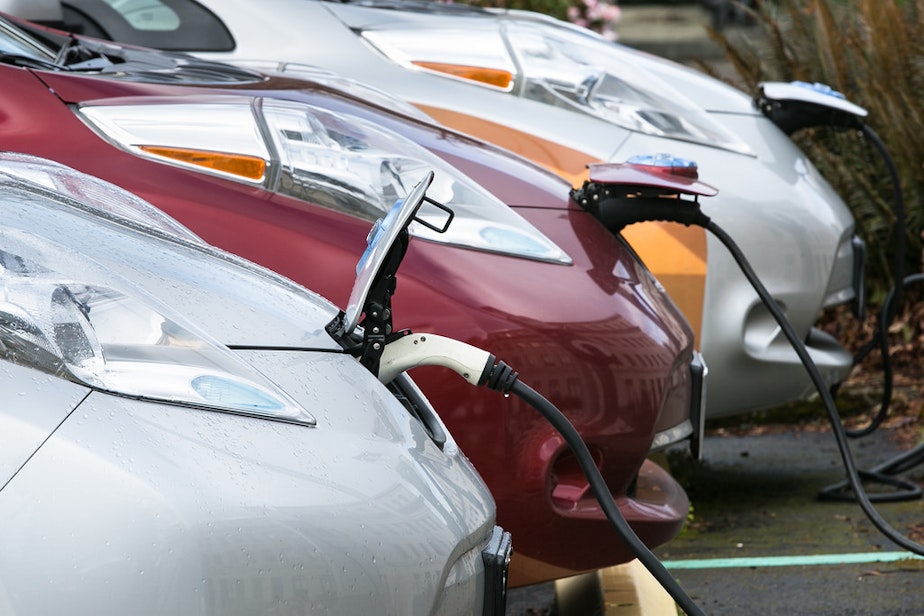Electric vehicle sales accelerate in Washington state

One in six new cars sold in Washington since January can plug into a power outlet.
Electric vehicles and plug-in hybrids sold at nearly twice the pace in Washington state that they did nationwide in the first five months of 2023, according to the Electric Power Research Institute.
In 2022, electric vehicles were few and far between on car dealer lots in Washington state.
Now, the zero-emission cars are more widely available as the state attempts to kick its century-old gasoline habit and help keep the planet’s climate livable.
A year ago, electric-vehicle manufacturers were diverting their green cars to states like California that had more favorable incentives, leaving Washington drivers in the lurch.
“We saw that change as of the end of the year,” said Matthew Phillips, who owns Car Pros, a chain of seven auto dealerships in Washington and California. “So we're seeing a lot more of the vehicles in Washington state, and also the manufacturers have a lot more models and a lot more availability in general.”
Sponsored
Late last year, the Washington Department of Ecology revised its zero-emission vehicle program to align with other states’ programs by offering auto manufacturers “early action” credits for electric-vehicle sales starting with model year 2023, instead of holding off until 2025.
“That helps incentivize more manufacturers to make qualifying models available sooner,” Bryan Imai with the Washington State Auto Dealers Association said by email.
Sales of electric vehicles have doubled in Washington over the past two years. The clean cars have been most popular in San Juan County (25% of new-car purchases to date in 2023) and King County (23%), according to Rachel Gantz with the Electric Power Research Institute.
Only California and Washington, D.C., have higher electric-vehicle adoption rates than the Evergreen State, according to Joel Creswell with the Washington Department of Ecology.
Still, Washington state is less than halfway toward its mandate for electric vehicle sales two years down the road: 35% of model year 2026 vehicles sold in the state must be emissions-free. By 2035, all new cars in Washington must have zero tailpipe emissions.
Sponsored
“The constraints are really going to be twofold: If the manufacturers can produce enough vehicles and if the consumers are going to buy them,” said Phillips, who drives a Kia EV6 with a battery range of 310 miles.
“The sales rate in Washington is already really, really high, even without a lot of policies to back it up,” Creswell said. “There's clearly an appetite here in-state, but the state government is investing a lot of energy and effort into figuring out what else we can do to transition away from fossil-fuel-powered transportation.”
In addition to a shortage of charging stations, many EV drivers complain of the hassles of charging away from home, including chargers that don't work and having to open, log in, and deposit money into an online account before being able to buy electricity on the road. The Washington Department of Agriculture, which regulates fuel-supplying equipment, mandated in December that new charging stations must accept credit cards for smoother, faster transactions.
Washington state currently offers a sales tax break on electric vehicles—new and used—and is planning how to spend $50 million on rebates and other measures to spur electric vehicle adoption, especially for lower-income drivers.
That funding should be available sometime in 2024, according to Creswell.
Sponsored
The vast majority of passenger vehicles are sold used, not new.
“That’s the primary way people buy vehicles,” said Steven Hershkowitz with the Washington Department of Commerce. “Higher-income consumers are more likely to buy new vehicles.”
Current incentives for electric vehicles in Washington state include:
Federal income tax credits
- New cars – Up to $7,500, varying by car model.
- Used cars – Up to $4,000 on vehicles selling for $25,000 or less. Starting in 2024, buyers can get this incentive as a point-of-sale rebate, instead of needing to claim a deduction on their income tax.
Sponsored
Washington state sales tax exemption
- New vehicles are eligible for exemption on sales cost up to $20,000 until July 31, falling to $15,000 on Aug. 1.
- Used vehicles are eligible for sales tax exemption on up to $16,000 of sale price.




